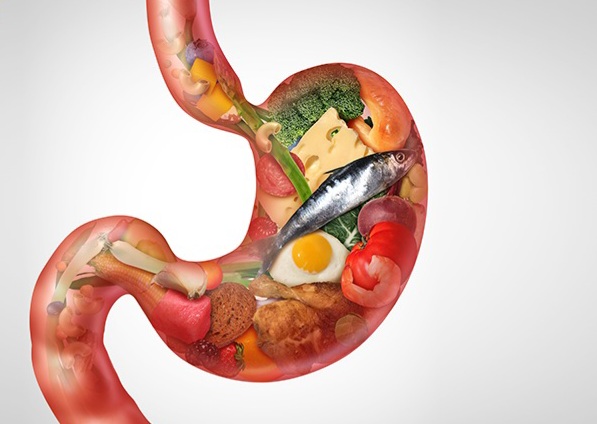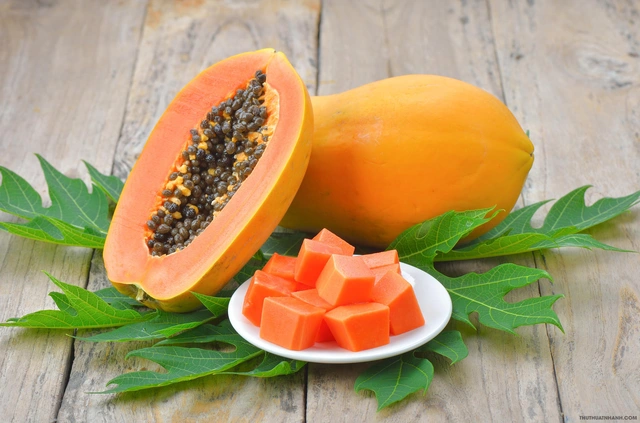In fact, the incidence of diseases related to poor nutrient absorption due to digestive enzyme deficiency is increasing. However, many people still do not know exactly what role digestive enzymes play in the body.
1. Benefits of digestive enzymes for the body
Digestive enzymes are a group of enzymes used by the body to break down macronutrients, such as carbohydrates, fats and proteins, into their individual components to ensure proper digestion and absorption of nutrients.
The function of enzymes is to help speed up chemical reactions in the body and play an important role in the digestive process.
The nutrients in food are all complex substances and can take a long time to break down and absorb into the body without the participation of digestive enzymes. Enzymes are not only found in saliva but also appear in digestive juices throughout the digestive process. Each type of enzyme even has the function of breaking down different types of compounds in food.

The body needs digestive enzymes to break down nutrients.
Digestive enzymes are divided into three main classes:
- Protein-digesting enzymes are needed to metabolize proteins.
- Lipases are needed to digest fats.
- Amylases are needed to break down carbohydrates.
Each type of digestive enzyme plays a specific role in the digestion and absorption of nutrients in the body. Here’s how each type of digestive enzyme works in the body:
- Amylase: Found primarily in saliva, amylase helps break down starches into simple sugars to aid in digestion.
- Alpha-galactosidase: Needed to break down starchy, indigestible foods, including gas-causing ingredients like beans, broccoli, and cabbage.
- Cellulase: Responsible for digesting cellulose, a type of fiber found in the cell walls of many plants.
- Glucoamylase: Helps break down the bonds of common starches in the diet to help form simple carbohydrates.
- Invertase: Aids in the hydrolysis of sucrose or table sugar into fructose and glucose.
- Lactase: Catalyzes the breakdown of lactose, a sugar found in milk and dairy products.
- Lipase: An enzyme produced by the pancreas that helps your body digest and absorb fats.
- Peptidase: Responsible for breaking down peptide protein chains into individual amino acids.
- Phytase: Facilitates the digestion of phytic acid, a natural compound found in plant seeds as well as nuts, whole grains, and legumes.
- Protease: Helps break down long protein chains into smaller units called amino acids.
2. Who is at risk for digestive enzyme deficiency?
Research shows that older adults, people with medical conditions, and people with digestive problems often lack important digestive enzymes that the body needs.
Signs that you may be lacking digestive enzymes include:
- Indigestion
- Acid reflux
- Heartburn, indigestion, or belching
- Morning fatigue
- Difficulty sleeping well
- Thin or falling hair
- Dry or lifeless skin
- Difficulty concentrating
- Arthritis or joint pain
- Muscle weakness or feeling too tired to exercise
- Mood swings, depression, or irritability
- Headaches or migraines…
When supplemented, digestive enzymes can help reduce stress on the digestive system and reduce symptoms such as abdominal pain, bloating, acid reflux, and fatigue…

Papaya is a natural food that contains digestive enzymes.
3. How to supplement digestive enzymes?
Digestive enzyme deficiency can be treated by adding foods containing digestive enzymes to your diet or taking supplements.
Natural food sources: There are many living plants such as fruits and raw vegetables that contain enzymes that aid digestion.
Some fruits and raw vegetables grown in nutrient-rich soil are the best sources of natural digestive enzymes such as:
- Pineapple
- Papaya
- Kiwi
- Banana
- Mango
- Avocado
- Yogurt and kefir
- Apple cider vinegar
- Miso, soy sauce and tempeh (fermented soy products)
- Sauerkraut and kimchi…
Food sources: Digestive enzyme supplements mainly come from 3 sources:
- Fruit-based (usually derived from pineapple or papaya). Among them is bromelain, an enzyme derived from pineapple, which is capable of breaking down many types of proteins, has anti-inflammatory properties and can withstand a wide pH range. Papain is another enzyme derived from raw papaya, which helps break down small and large proteins.
- Animal sources, including pancreatin derived from cows or pigs.
- Probiotics, yeasts and fungi.
However, when using digestive enzyme supplements, you should consult a gastroenterologist or nutritionist. Depending on your health condition, your doctor will prescribe the appropriate and safe type of digestive enzyme.





